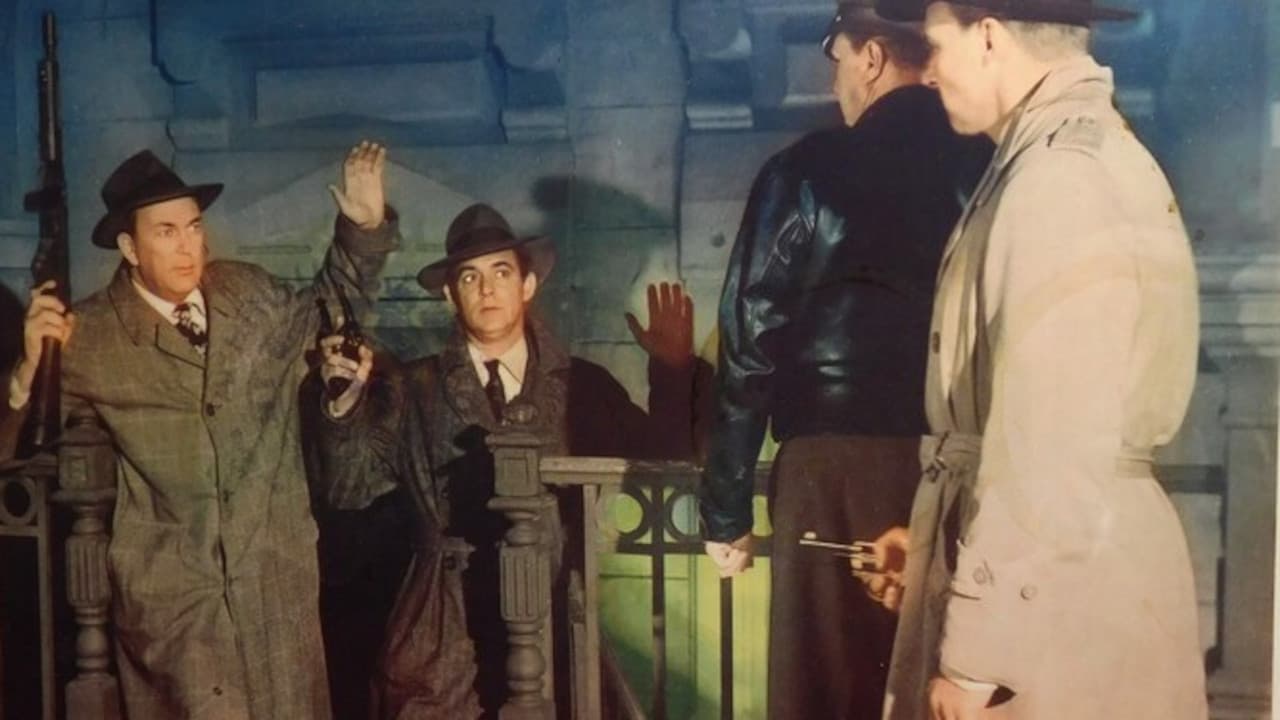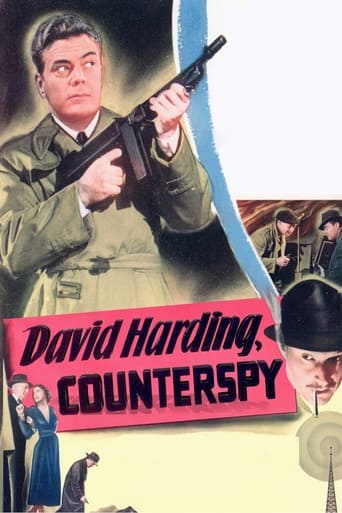



Wonderfully offbeat film!
Boring
The movie really just wants to entertain people.
I think this is a new genre that they're all sort of working their way through it and haven't got all the kinks worked out yet but it's a genre that works for me.
View MoreI used to listen to the radio program COUNTERSPY when I was a kid, and can clearly recall running off to the American Theater to see this film when I was about 11, as I really wanted to 'see' David Harding, its lead character. All I remember now is not being surprised by Howard St. John, who played Harding on the radio, as he was exactly what I pictured David Harding would look like! Did they visually type cast even on the radio?Anyway, seeing this film again after 65 years, I was rather surprised at just how good it was for a little radio-inspired B film. Well-mounted and acted, the real lead in the film is Willard Parker, an actor I always liked as a kid and still, to this day, can't quite understand why he never got out of Bs. His was a stalwart, ruggedly handsome presence (even more so than John Wayne's!) and he was really quite a good actor (as his delivery of some intentionally funny dialogue in this film shows). What surprises me now is just how unsympathetically Harding is portrayed; he is overbearing at all times, and more than willing to suspend anyone's legal rights if the fit is upon him. I don't recall him coming over as quite this type of agency head in the radio series. Of course, this was made during the Cold War, with a couple of semi-veiled descriptions of a particular dictator "with a large mustache", so we get the point that this was serious business and that Harding was not too interested in the finer points of the law in achieving his aims. Had they existed back then, reading one his or her Miranda Rights in this film would have been tantamount to turning it into a science fiction movie. This may not go over too well now, but in 1950 I'm sure most viewers were totally on his side. Audrey Long is fine in the female lead and when midway through the film we find that she is not quite the grieving widow of Parker's late friend as portrayed up to that point, it is quite a surprise - as is the real villain of the piece, played by Raymond Greenleaf in absolutely the best performance I've ever seen from him. Allied with the outward beneficence of the character he portrays, he gives nastiness a new definition in such a film as this one. Everybody in the movie seems to be either a government agent or a spy (or both) and the only likable character in the whole film is the one played by Parker. This is rather unusual for a B film of this type, meant mainly to fill the grind houses on Saturday or Sunday kiddie afternoons (which is how I saw it in 1950). Really, I kept expecting an uncredited Victor Jory, Paul Guilfoyle or Jack Lambert to come jumping out from behind a bush! But it looks good, has a decent amount of suspense even when certain expected results have been telegraphed to the viewer in advance, so that we often know exactly what is going to happen from one scene to the next, and the film gives what I have to assume is truthful coverage of the way such an agency as Harding's would have operated in those days. A good little film and worth viewing.PS: This film 'stars' Parker and Long and, under their names, 'introduces' Howard St. John as Harding, but St. John had been in a good number of films prior to this one. Ah, the things one could get away with in those days.
View MoreHoward St. John, the distinguished character actor best known for supporting parts in "Born Yesterday" and "Li'l Abner", took on the title role (not quite the lead, but the moral conscience behind the story) in this single movie version of the radio series by Philip Lord (the man behind "Mr. District Attorney", another radio series which became a single film and later a brief T.V. series), playing an American espionage agent during World War II who utilizes false "confidential" information to entrap foreign agents. The story focuses on the romance between naval Lt. Commander Willard Parker and his secretary (Audrey Long) who unintentionally drops indications that she too might be one of the spies. This leads Parker into danger, and in one very tense series, he is knocked out and left for dead as the spies prepare to burn him to death! Spies, it seems, are everywhere, even with a bartender whom Parker insults over his lack of alcohol in a drink. "If this drink was any darker, it would make great colored water", a variation on a line from the classic play "Stage Door", left me in hysterics. The film takes some time to get off the ground, but shortly into its 70 minutes, it has you looked. The lead villain, it appears, is somebody that Long has known all her life, and they are not afraid to give her their backhand across the face to keep her in line. As this was made during the Korean war (but set during the second World War), it still had timely statements to make, and even today when spies are discovered in the oddest of places, it is still pretty potent and excellent "B" movie fare.
View MoreBased on the radio series Counterspy. the title role of David Harding is played by Howard St. John as the rather stern Allen Dulles like section chief of an unnamed Intelligence agency. But the real action is handled here by Willard Parker who gets called back from the Pacific War to takeover the operation of a plant in California that is manufacturing torpedoes for the Pacific War.As it turns out the widow of the guy that was in the job before Parker is Audrey Long who was going out with Parker while he was in Annapolis. After a while the two take up where they left off before. Still Parker's job is to find a nest of fifth columnist spies who've been getting information out of the plant.I was pleasantly surprised in that I thought while hardly a great film, it was not as bad as I thought it would be. I was expecting a Cold War flag waver and it was not all that. The characters are not paste board figures, they do have some depth to them.Take particular note of Raymond Greenleaf's portrayal of the plant doctor. Talk about hidden depth.Nothing great here, but David Harding Counterspy might be worth a look.
View MoreColumbia Pictures produced a number of films based on Old Time Radio programs. Several were serials, such as Captain Midnight and Jack Armstrong. But this one is a feature. Based on the radio program, "Counterspy," the radio show originated in 1942, and spent its war years having Harding and his counterspies contend against Gestapo and Black Dragon activities. The show was popular, and continued through 1957.The film was set in the Cold War, but effectively was a flashback to 1943. In the beginning of the film, Harding causes a radio commentator to break a story with planted disinformation, so he brings the commentator in and, to compensate, gives him the story that comprises the film.At the beginning of the story, a tough-as-nails Lieutenant Commander in the Navy, Jerry Baldwin, is drafted by the Counterspies to investigate espionage activities in a plant that manufactured torpedoes. Baldwin's predecessor, Phil Iverson, an Annapolis classmate, who was stationed at the torpedo plant, had been found dead, presumably from smoking in bed, but with some suspicion of murder. Baldwin was to take Iverson's job, but working with the Counterspies.Iverson's widow, Betty Iverson, was a woman that Baldwin was in love with before she married. She is asked to take her old job back, as secretary to Baldwin. Baldwin dates her, and romance blooms. However, it turns out that she's in cahoots with the factory's doctor, George Vickers, who's the head of an Axis spy ring.The story's scattered with a lot of clandestine activity, and refreshingly, most of the characters are fairly intelligent. A number of spy tricks are presented, and the story is worthy of the radio program it emulates.David Harding, as a spymaster, usually directed activities rather than acting as a field agent. The film follows this pattern.Especially good if the viewer is familiar with the radio series, but entertaining even if this is the first exposure to the title character.
View More